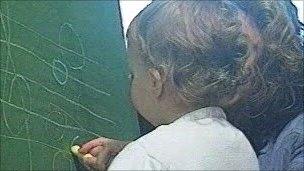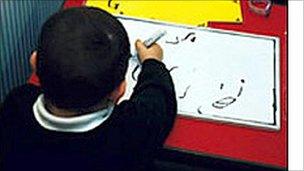What should two-year-olds be able to do?
- Published

The idea is to give poorer children opportunities open to their richer classmates
Two-year-olds from the poorest homes in England are to be given free nursery places - but what will they be expected to do - and will it help?
Peep into any nursery and it might look like the toddlers playing on the mat are just doing what toddlers do - rolling around, mucking about with trains or having a pretend tea party.
But for nursery staff and child development experts it is also a learning opportunity.
A child playing with trains could be encouraged to count the pieces of track they put down; one making shapes with moulding clay is using his or her imagination to create something; they might talk about it - building their communication skills - and using their fingers in this way will strengthen their hands and help build the co-ordination they will need to learn to write.
"Learning through play" has been a dominant mantra in reception classes and nurseries for a long time.
'Nappy curriculum'
Only today, those fun activities are closely watched and monitored, noted in files which are in turn, checked by Ofsted.
Physical co-ordination - tick; counting - tick; imaginative play - tick.
What toddlers are expected to do is set out in what has been dubbed England's "nappy curriculum".
Since 2008, nurseries and child minders have had to check what their charges can do in six "areas of learning".
These cover language and early reading and writing, reasoning and numeracy, knowledge and understanding of the world and physical and creative development.
Within this, there are 59 "early learning goals" - which vary according to age.
Goals for two-year-olds include "understand simple sentences", "listen to and enjoy rhythmic patterns in rhymes and stories", "express themselves through action and sound" and "begin to make and manipulate objects and tools".
That does not mean they are sitting at desks learning to read.
Sarah Steel, managing director of The Old Station Nursery Group, describes a typical nursery room for two-year-olds: "It's about moving them from the secure environment of the baby room to give them new experiences.
"There is a 'reading area', with lots of books for cuddles and stories, a construction area where they can make things out of blocks and equipment; a role-play area with a kitchen or a shop or a crib set up."
While the Labour government insisted its strategy was very much about "learning through play" - through just these kinds of activities - sceptics derided what they called the "tick-box" mentality of what is called the "Early Years Foundation Stage", which runs from birth to five.
Educating parents
Sarah Steel believes the framework set out what most good nurseries were already doing.
"There was such a lot of fuss about it, what it did was bring together two frameworks which existed for nought to three-year-olds and the foundation stage [three to five-year-olds]", she said.
"It is complex - but no more complex than a child. And it is mainly guidance - there are not many parts which are statutory."
One of the 15 nurseries in the Old Station group has been taking part in the pilot scheme begun under Labour which gave free nursery sessions to two-year-olds from poor families - the idea now being expanded by the coalition government.
Sarah Steel believes this programme could help children from poorer homes by giving them different experiences and by involving their parents with their early education.

Labour had given free nursery places to some of the poorest two-year-olds
"They would do a range of activities they might not otherwise get to do at home," she said.
"We might bring in a dance teacher or do french. They will socialise with others and it's possible they might not get that stimulation at home.
"Parents would also get some support. We would share with them what the children have been doing and talk to them about what we have been doing - for example if we have been doing autumn, we could suggest they collect conkers."
England's Children's Commissioner Maggie Atkinson agrees, saying giving nursery places to two-year-olds from poor families will give them a better chance in life and level the playing field between themselves and their richer class-mates for when they start school.
"It makes an enormous difference if good provision is put in place," she said, adding that a major factor was the contact established between the nursery and the home.
Life chances
Labour first offered free nursery places to four-year-olds and then three-year-olds and had piloted a scheme giving 10 hours for the most disadvantaged two-year-olds, which they had promised to expand.
Its philosophy - echoed by the Deputy Prime Minister Nick Clegg on Friday - is that the life chances of a child from a poor home are greatly improved if they have access to good childcare which prepares them to learn at school.
Purnima Tanuku, chief executive of National Day Nurseries Association (NDNA) agrees: "Nurseries are there to help children prepare for life and the skills and confidence to succeed in school through a play based approach and building of social skills.
"Nurseries also often help identify early on where a child might have a need for extra support, for example cases of autism or developmental delay. The nursery will often support the parent to get the help their child needs, so they then start formal learning with their needs identified."
The early years sector could see some changes coming its way.
The coalition government has asked Dame Clare Tickell to review its Early Years Foundation Stage (EYFS) policy - with a view to making it "less bureaucratic".
Although some nurseries had complained about the form-filling and "tick-boxing", as a whole they like the approach - and do not want to see it thrown out.
It is likely the coalition government is looking at whether all three and four-year-olds should have free nursery sessions as they do now - or whether funding should be limited to poorer children.
The results of the review will be published in the spring, with any changes expected to be made in September 2012.
- Published15 October 2010